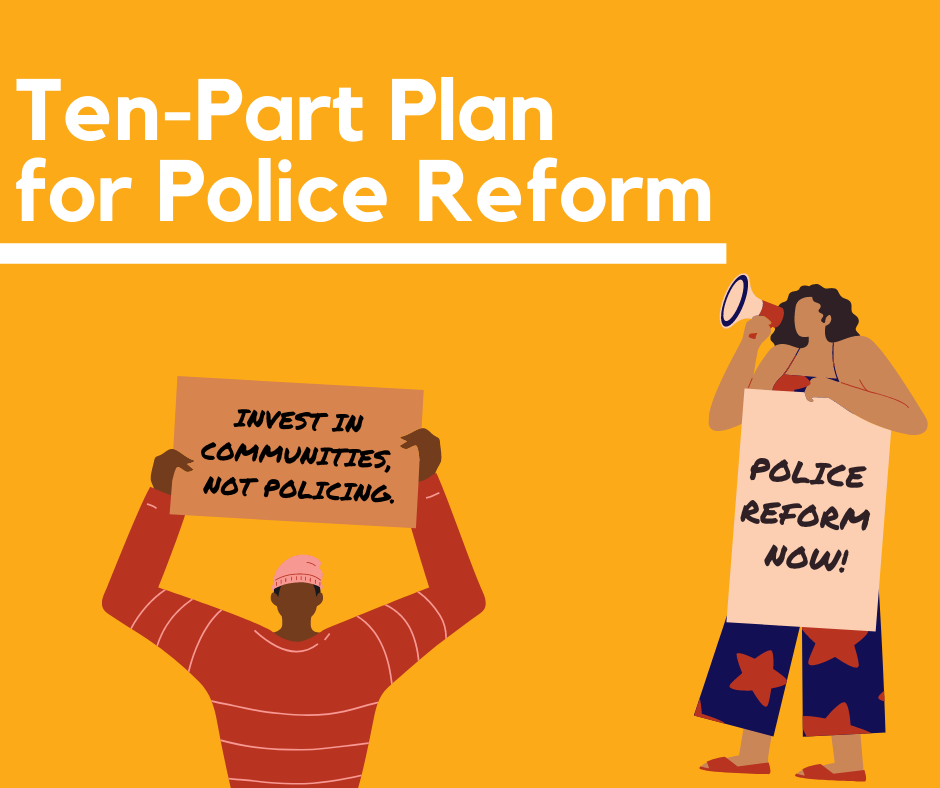Today, VPIRG joined the ACLU of Vermont, Justice for All, and more than a dozen other organizations in releasing a letter urging Vermont leaders to fundamentally reimagine the role of police in Vermont communities and to commit to the ten-point action plan below.
Police reform is just one component of a much broader push to dismantle systemic racism throughout our society and laws, but there’s no question that is a critical piece of that work – which is why we’re proud to support this platform.
This platform comes as the legislature begins to take public input on what the next steps on police reform in Vermont should look like. In the coming days, the House Government Operations and Judiciary committees will host three “virtual meetings” to obtain community input on police reform:
- August 6 at 1:00 p.m.
- August 12 at 6:00 p.m.
- August 16 at 4:00 p.m.
You can sign up here to give two minutes of testimony in support of police reform. If you have any questions, or would like to discuss this opportunity, please reach out to Sebbi Wu on our team at swu@vpirg.org.
You can also share your views and experiences by filling out this survey.
The ten-point platform:
- End qualified immunity. Vermont law shields officials who abuse their power from meaningful accountability. State lawmakers need to disincentivize police misconduct.
- Remove police from schools. The presence of “school resource officers” (SROs) disproportionately harms students of color, students with disabilities, and low-income students. We must end the use of police in schools and invest in educational support services.
- Limit police involvement in low-level offenses. We must prevent unnecessary police interactions which disproportionately impact people of color. That includes limiting police involvement in mental health crises, authority to conduct “consent”-based searches, and discretion to cite or arrest for petty offenses like “disorderly conduct.”
- Ban police use of military-grade equipment and techniques. Police militarization is unnecessary and dangerous. Giving police military equipment encourages the use of paramilitary tactics with civilians, including no-knock raids, as well as abusive “crowd control techniques,” such as use of pepper spray, rubber bullets, tear gas, and sound canons.
- Prohibit use of new and invasive surveillance technologies, including new surveillance technologies, advanced or autonomous weaponry, facial recognition software, and predictive policing technologies.
- Require appointment of independent counsel outside of State’s Attorneys and the Attorney General’s office to review and prosecute police misconduct.
- Increase transparency so that police misconduct cannot be concealed. That includes ending confidentiality for officer disciplinary records and other limits on public access to information.
- Require robust, systemwide data collection and analysis from police, prosecutors, courts, parole board, and Department of Corrections to detect and eradicate systemic racism.
- Establish community control and authority over law enforcement, including over police priorities, transparency, and discipline, and end collective bargaining agreement provisions that limit oversight and accountability.
- INVEST in communities, not policing. It is time to demand that our laws and our investments match our values as Vermonters, and to affirm that Black Lives Matter. Local and state policymakers must prioritize people and communities, not policing and prisons.
We believe this platform proposes common sense initiatives that will allow us in Vermont to be more intentional about how we promote public safety in our state. It is a step towards recognizing that we ask too much of our police forces in Vermont, and some needs simply are not best met by a police officer. It is a step towards true accountability of police, who for too long have had the luxury of policing themselves in cases of alleged misconduct. It is a step towards reckoning with the racist roots of policing in America, and the immense harm this system has caused. It is a step towards demilitarizing our police force and building a more peaceful, equitable state for all. It is a step towards a restorative justice system, rather than a punitive one. It is a step towards reinvesting in community-based services that are more cost-effective and better suited to respond to the true needs of the community.
And it is a step towards ending the harm our criminal justice system does to Black and Brown Vermonters every day.
This policy platform promotes the healthy, vibrant communities that Vermonters want and need while addressing the fact that we have invested too narrowly in a punitive system that disproportionately injures marginalized communities without addressing the root causes of the problem – like access to health care, housing, childcare, education, and economic opportunity. We are proud to support the Reimagining Police Reform platform and look forward to supporting leading organizations and individuals across Vermont in making it a reality.
The road ahead is long, but we must take these critical steps towards reforming our public safety system to better protect all Vermonters.

